There’s no denying the incredible effect that farming-sim games like Stardew Valley, now often referred to as cozy games, have had on the video game industry as a whole. Stardew Valley was released in 2016 and was an almost instant success, eventually selling over 25 million copies and counting. Eric Barone, aka Concerned Ape, was the designer and this game was his love letter to the early Harvest Moon (Story of Seasons) games that grew into one of the most successful and popular indie games ever.
Stardew Valley kicked off an explosion of farming sims and “near peer” farming sims by indie developers that gamers ate up. Not only have more and more farming sim and workshop crafting games come out, but the larger genre of “Cozy games” came to describe these easy-paced, relaxing video games that have become an impressively sized niche of indie game releases each year.
So just why are there so many farming sim games like Stardew Valley? Why have cozy games become their own popular niche in gaming? Just what is it that made Stardew Valley such an incredibly successful and beloved game, and why has the cozy game genre as a whole become so popular even with gamers who already loved other genres of gaming?
Shane’s talked to many other gamers, took a deep dive in the topic himself, and has come up with these multiple reasons that help explain why these games are not only so popular – but why cozy games as a whole are almost certainly here to stay.
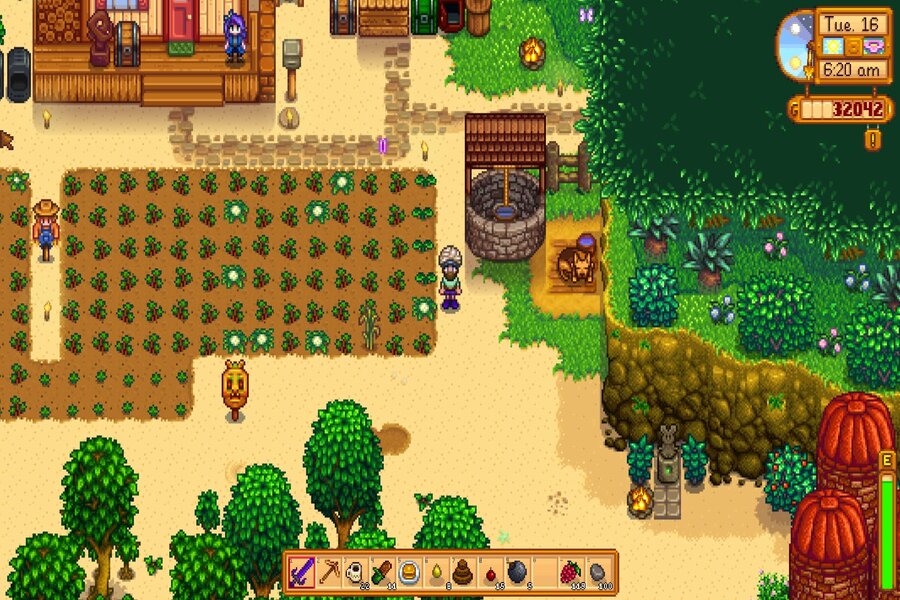
Comfort in Uncomfortable Times
There aren’t a lot of people feeling confident about themselves, their present, their country, their kids’ future, or their own future. While I’m not going to spend a lot of time on politics or economics in a gaming article, the fact that so few people feel good about life, prospects, and whatever else just shows how uncomfortable life is for most of us right now.
And that’s before dealing with the last few years of the Pandemic, political unrest, and what is often referred to as the curse of “Living in interesting times.”
So having a game that offers challenge and adventure, but achievable challenges or adventures, goals that you have 100% full control to meet, and an area that you can’t lose that is “your own,” this creates a ton of familiarity and comfort that many people in the real world have no shot at.
Because of that, there’s just something comforting about having your farm, your ranch, or your workshop, depending on which cozy game like Stardew Valley that you’re playing.
Goals are simpler. There is no “Pay off student loans…somehow” or “Find rent money that doesn’t exist.” Chores are “Water the 40 crops,” or “Go talk to everyone in town,” or if you like dark humor like Graveyard Keeper “Go bury that body in the cemetery.”
The “grind” in these games is comforting because absolutely everything in these worlds is achievable, familiar, and action always leads to progress in these games, which is comfortable. There’s something very soothing and relaxing about all that.
Comfortable Repetition
Farm sim games like Stardew Valley tend to have many of the same or similar mechanics. While there might be slightly different twists on them, this means that in general a player already knows many of the most important mechanics. This means I don’t need to worry about spending limited hours I have for gaming trying to learn how a video game works and struggling to do so.
Watering crops is simple. Planting is simple. Feeding animals is simple. Take the axe to the tree, the pick axe to mineable rocks, and the sword to defend yourself in games that have combat.
That familiarity allows players to combine the wonderful newness and excitement of a brand new gaming experience with controls and gameplay the player is already comfortable with. This creates an unusual blend in the genre of being able to pick up on all the unique odds and ends to any new game because the core mechanics are the same.
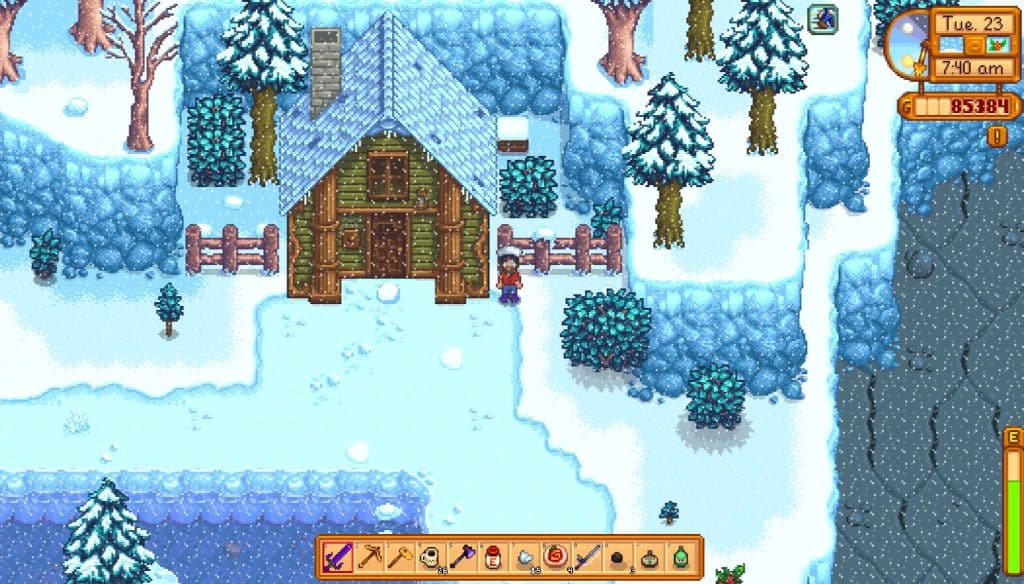
Playing At My Own Pace
Sure, there are season changes in most games or certain times I have to look for characters or things I need to do to unlock another area, but I can play at my own pace. There is no “You’ll never get another chance” scenario.
Different farm-sims and cozy games tackle this in very different ways. Stardew Valley, Littlewood, and Graveyard Keeper are three prime examples of games that handle passing time differently, but all of them still let you do your thing at your pace.
If you miss something, eventually there will always be another chance!
Look at this great poll of cozy game and farm-sim fans that was done by PrinceRaglan (great small YouTube gaming channel – go subscribe to show your support) that shows how much many gamers simply appreciate this type of setup.
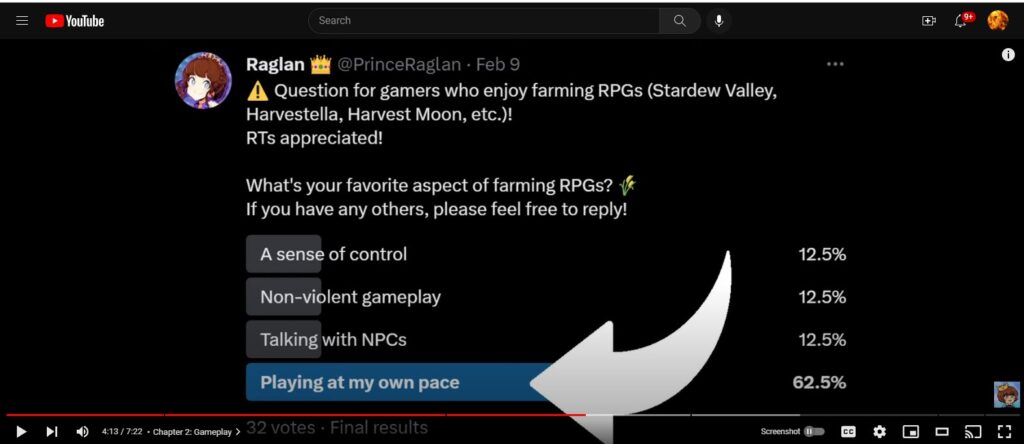
That isn’t just a winning showing, that’s a pounding. Being able to play at your own pace is great. This allows you to have a second screen playing a movie or YouTube videos, you can chat with friends while paying half attention, or just go a day at a time here and there. Or rush 20 hours in a row. Whatever you feel like doing.
This combination of control and being able to do things at my own pace, and to have the freedom to do what I want and when I want to do it, all of that leads to a lack of stress, which is what I want from my entertainment. I don’t want frustrating games that stress me out or piss me off after a long 12-hour shift, I just want to enjoy my time getting in a bit of recreation.
I love a game where I’m not rushed. If I’m not the sharpest tool in the door with a game, I get a second chance. Stardew, and most farm-sim and season based games in the cozy niche go around the calendar. If you miss something in a season, another one will come around again in year two. So no biggie, no problem.
I can play my game at my pace without long-lasting consequences as there often are in regular life…and in-game almost everything is under my control. Again, as opposed to what many of us experience in the real world.
Guaranteed Friendliness
There are many more good people than bad in the world, just as there are many more nice than rude. I truly believe that. That said, that still leaves room for millions of jerks out there, and for some reason they always want to make it known what they think of you. In cozy games you will generally find overwhelming friendliness.
If there isn’t it’s often due to setting up character growth, a storyline where it just seems funny (Graveyard Keepers know who I’m talking about, oh Snake…), or you did something like throw their trash all over the ground in front of them.
But for the most part unless you’re going the Dangerously Funny route of antagonizing everyone (and hey, play your own game) then you will get a level of friendliness and openness that many of us are not used to receiving on a daily basis. And let’s face it, that’s nice.
Control Over Online Environment
Control is always nice to have an in-game you actually have that. If there’s multi-player you’re inviting the friends you want to play with, not running into foul-mouthed trolls online. You get to control who you interact with, and even if you just play with NPCs you still get to choose who you grow friendships with and who you don’t.
In our Patreon in the Stardew Valley chat room many discussed my namesake (Shane) being just the worst. Turns out I was the only one who went beyond two hearts so I was the only one who knew about his really emotional character arc. He was just such an aggravating NPC to so many players they never bothered to talk to him more – even after 100’s of hours of playing the game.
Even in that world, the power was yours to choose who you spent your time with, NPC or not.
Actual Meritocracy vs Lies of Meritocracy
So I might get in some trouble for this one with some, but for most of us the idea that life or career in any way, shape, or form is a meritocracy doesn’t match up with the reality we live in. There’s no shortage of people who work 80 hours a week and can’t break even.
What’s this have to do with Stardew Valley and other games like it? Well these games all have something very much in common no matter how different a take on cozy games they have:
Simply put, unlike so so often in real life: hard work is rewarded.
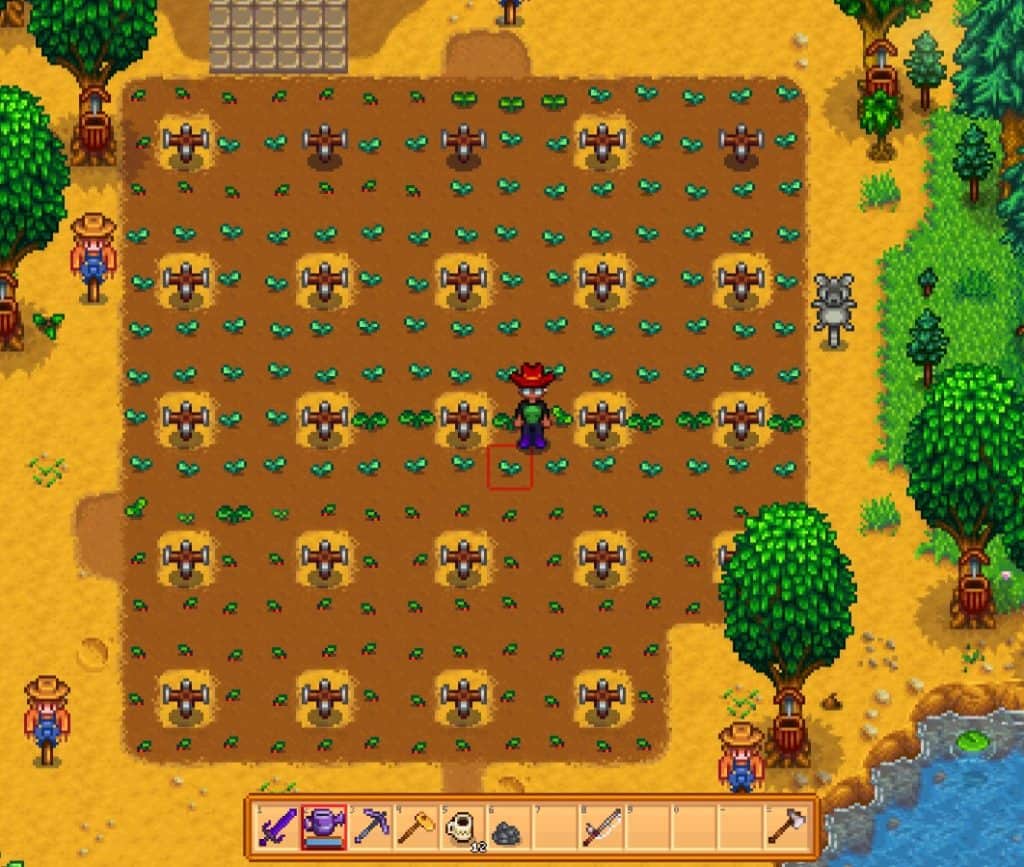
That simple, not caveats or conditions or anything else added. If you plant more crops, you harvest them and make more money. If you break more rocks in the mines you get more gems. If you fish endlessly, there’s always someone willing to buy them, and then there’s always more fish.
Then there’s also the popular (but dark humor) meme about Stardew Valley that gets that dark laughter because it hits home. You get a house, no matter how rundown, from Grandpa. That makes you a homeowner: the Ultimate millennial fantasy.
That hits too close for many, but the fact you can start with a little and make it a lot – and that “little” to start is more than many players have realistic hope for, further shows why this peaceful, merit-based world is so popular.
Small Town/Country Living As People Dream It Is
There are a lot of wonderful benefits to living in a small community or rural area. When people around there are friendly, when the idea of community exists, and if you’re accepted. Speaking from experience, god help you if you’re unpopular or on the other side of accepted. But that’s the nice thing about these cozy games: it’s always small town or country living at its best.
Almost all the positives and very few of the negatives, or certainly the ugliest of the negatives and these, again, you have the ability to change in-game for the better.
Stardew Valley is interesting because it has more of the dark side of things than other games. Take, for example (slight spoilers ahead):
- Shane’s struggle with alcohol and severe depression
- Lewis and Marnie’s secret tryst and (quite possibly) very unhealthy relationship
- Jas and the trauma from losing her parents
- Hints at Pierre and Caroline’s unhappy marriage
- Hints at Jodie being unhappy or regretting a lot of her life
- Kent’s PTSD
- The whole Abigail thing
There’s a lot going on in this small town – and I think that’s actually part of the reason why Stardew Valley works so well. It adds a dimension of realism yet somehow toes that line to add redemption, to keep it from overpowering the game, to find bits and pieces of resolution that still make Pelican Town overall a really happy and loveable place.
The shadows and warts are still there – but they feel less. And the good parts of small town and rural living are present and emphasized more.
It’s a balance no other game has pulled off in the same way and is part of the reason that Stardew Valley remains the new gold standard for farm-sim games and cozy sim games.
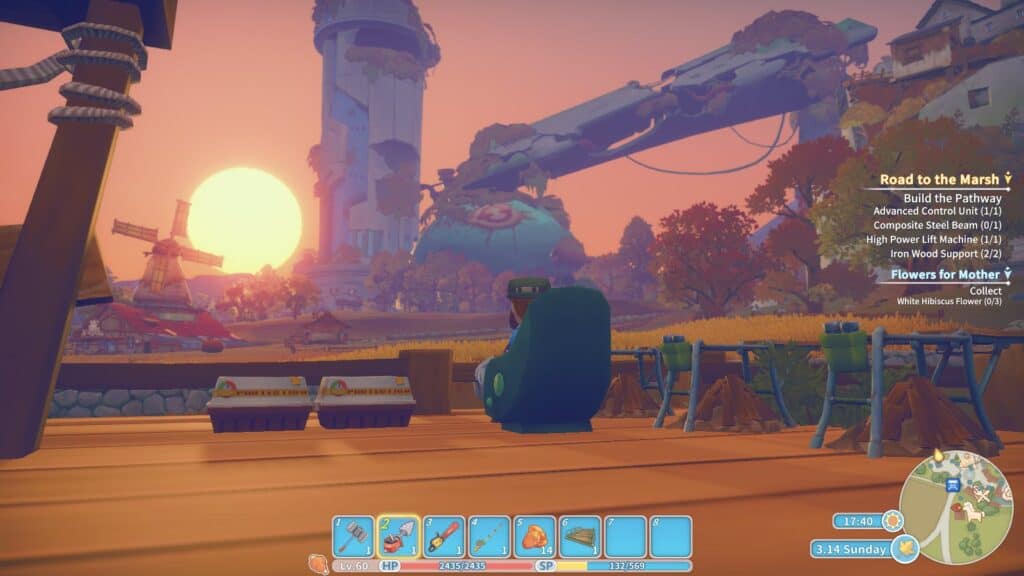
They’re Just Good Games
Let’s not ignore one of the most important reasons that Stardew Valley, and the most successful cozy games following it, are successful: because they are just straight up good games.
Taking a look at just Steam Rankings (as of 04/26/2023)
- Stardew Valley – Overwhelmingly Positive 473,777 votes, the 3rd most popular game of all time (also interesting to note is Terraria, a world builder that is sort of cozy-game adjacent, is the 2nd most popular game of all time)
- Slime Rancher – Overwhelmingly Positive 106,088 votes, the 22nd most popular game of all time
- My Time at Portia – Very Positive 30,900 votes
- Graveyard Keeper – Very Positive 25,522 votes
- Slime Rancher 2 – Overwhelmingly Positive 17,598 votes
- My Time at Sandrock – Very Positive 10,903 votes
- Literally dozens of other cozy games were Very Positive at 3k-10k votes
These are good games in a niche that has only recently really gained purchase, and even the many smaller known titles are still ranking not just positive, but Very Positive. I’ve also seen several around 1K reviews bordering on Overwhelmingly Positive. There’s a lot of love for these games not because of title or coming from a big studio, but because they provide excellent gameplay.
You don’t get scores like this from a mediocre game or endless repetition a la mobile freemium games. You get scores like this because a LOT of people played the games and found them extremely entertaining and rewarding.
If they weren’t good games then we’d talk about that one farm-sim game Stardew Valley that did very well and not care about any of the others but it’s been many years since Portia, Graveyard Keeper, and others were released and they still get talked about, still have enthusiastic fans, and sequels like My Time at Sandrock and Slime Rancher 2 have (deservedly) been long-awaited and well received from fans of the first games.
Many Different Flavors of “Cozy” Games
If you’re tired of the farm sims you can go raise slimes on a ranch. Or craft away at a workshop. Or go dark humor and bury bodies while doing all kinds of unsavory things to try and get home, enjoying the super dark humor of it all as you go. Or build a space colony through spear fishing and selling paintings of the alien world. Or just run around the Outback.
There are so many different types of cozy games and while some are similar to Stardew Valley just building and growing off of it, some are extremely different in style and tone, but can still thank SV for a rejuvenation not just of farm-sims, but of the idea of cozy games as a genre in and of themselves.
But that wide array of games that fall under the “cozy” tag means there’s always multiple options for a relaxing game that is designed to take away the stress of the day.
List of Great Cozy Games
There’s no shortage of cozy games, and that’s because this went from being a handful of farm-sims coming from the tradition of early Harvest Moon and Rune Factory games to proving it was a viable genre and indies (and indie studios) to pick up and continue to add, improve upon, and experiment with different ideas in and around this style of video game.
- Stardew Valley
- My Time at Portia
- My Time at Sandrock
- Graveyard Keeper
- Slime Rancher
- Slime Rancher 2
- Rune Factory 4
- Rune Factory 5
- Verdant Skies
- Animal Crossing
- Garden Paws
- Dinkum
- Coral Island
- Sun Haven
- Harvestella
- Littlewood
- Kynseed
- Len’s Island
- Spirit of the Island
- Garden Story
- Yonder: The Cloud Catching Chronicles
- Ooblets
- Roots of Pacha
- Sakuna of Rice and Ruin
- Story of Seasons: Friends of Mineral Town
- Story of Seasons Doraemon
- Doraemon Story of Seasons: Friends of the Great Kingdom
- Story of Seasons: It’s a Wonderful Life
- Story of Seasons: Pioneers of Olive Town
- Bear and Breakfast
- Ooblets
- Little Witch in the Woods
- Green Project
- World’s Dawn
So Are Cozy Games A Phase, Or Are They Here To Stay?
Based on the sheer amount of cozy games in development, and the fact that the number of gamers who look for these titles and buy them is growing, they aren’t likely to be going anywhere.
The combined showings at E3 and Summer Game Fest in 2021 were notable because over 33% were without combat. Add in the fact that cozy games are often a genre developed by Indie developers, and that means quite often these aren’t games developed by large Triple A studios out of touch with gamers and worried about squeezing every penny out of a title, but they are focusing on creating a game that is fun, something they’d want to play, something that actually adds to what’s available to gamers.
There’s very little doubt in my mind that not only is the cozy game genre here to stay but it’s likely to continue to grow moving forward into the future as more and more people find they want that calmness, that peace, that relaxing vibe from somewhere – anywhere, and these types of games will continue to provide it.
Other Cozy Game Articles You May Enjoy
- Best 21+ Games Like Stardew Valley
- How to Get Auto-Petters in Stardew Valley without Joja
- My Time at Portia Tricks, Tips, & Strategies
- Why Is Stardew Zoomed In Too Much?
- My Time at Portia Make Money Guide
- Unlocking Last Balloon Platform Littlewood
- Blue Point Guide Graveyard Keeper

Proud to embrace the locally created moniker of “Corrupt Overlord” from one of the all time great Lords of Waterdeep runs, Shane is one member of the Assorted Meeples crew and will be hard at work creating awesome content for the website. He is a long-time player of board games, one time semi-professional poker player, and tends to run to the quirky or RPG side of things when it comes to playing video games. He loves tabletop roleplaying systems like Dungeons & Dragons, Pathfinder, Werewolf, Fate, and others, and not only has been a player but has run games as DM for years. You can find his other work in publications like Level Skip or Hobby Lark.
